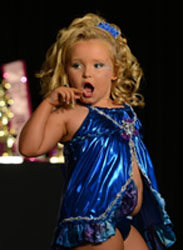The TV show "Here Comes Honey Boo Boo" strings together footage of a lower-class family in the Southern state of Georgia, US. These are rednecks and white trash. The youngest daughter, a frequent child beauty pageant contestant, and her the mother are the center of attention; altogether, the family shown on TV is devoid of manners nearly to the point of being uncivilized. I've only watched maybe 10 minutes of this show but enjoy reading the internet/news articles about it, which are mostly negative. The negativity is partly snobbery but, more so, I think it's evidence of the dominant truth-making discourses in the culture.
The main criticisms run along the following lines:
- The family is being exploited (which underscores the lack of opportunity in this country)
- The show rewards bad behavior (such as laziness, poor health, and having kids by multiple fathers starting at a young age)
- The show ridicules the family (and, by extension, people like them)

The exploitation claim provokes an interesting debate, but it first assumes the other critiques are valid. The other criticisms--I've seen many variants of them--spur from the public assumption and promotion of medical, psychological, and economic discourses that generate knowledge about life. The criticism is drawn from that knowledge: the family's steady diet of junk food will sicken them, reduce their quality and quantity of life, and ultimately create costs to be absorbed by the rest of the population; the sudden fame and the emphasis on pageantry, the patriarchal confusion, and the laissez-faire parenting will prove emotionally crippling. All this might bear out for various reasons, but the widespread condemnation of the show
for these reasons shows the power of these discourses in our culture. Society assumes these discourses and polices itself with their truths. It says, "Do not reward this behavior! Society must be defended!"
Notes:
1. Critics who've defended the show use the same discourses, saying the family's emotional health is OK because they are in on the joke and seem like they are happy and have decent familial relationships, etc.
2. Other critics have derided the show's quality, slamming it because it appeals to the lowest common denominator. This judgement, when pursued to its ends, justifies itself in the same discourses.
3. A show, especially one on a cable channel like TLC, doesn't need that many viewers to be a "hit". The standards for calling a show a hit have plummeted the last 20 years.
4. One well-written critique is
this one from the AV Club, of which the highlight for me is the following:
We’re meant to laugh at the poor manners that Alana and her sister Pumpkin exhibit when an etiquette teacher comes to help make them more ladylike. It’s not the pair failing to transform into princesses after one session that is depressing. It’s that the show presents even the very idea of them being able to reach a point at which not farting at the table is even possible as a totally improbable idea.
Ah, the coup d'etat of the family's dignity. Now, turn that around: when we train a monkey to roller-skate, we're meant to laugh at the monkey on roller-skates. There's no joke when the animal is untrainable. But, when these girls shrug off attempts to train them in formal behavior, it's a disgrace. (And AV Club comments suck.)
5. The author of the
Gawker article, "
The Perfect Level of Fame", makes the case that the show and celebrity attached haven't seem to hurt the family, at least. But what gives this piece distinction is the following comment from maryannmom:
- Wow. This is a really long article. I started with the first couple paragraphs, then started skimming, then scrolled to see how much more there was, then read the comments, which were disappointing. So I guess I never will no exactly what the Honey BooBoo phenomenon is, but then this cultural stuff is so depressing, it is starting to make me feel kinda unibomberish, in that hide-yourself-in-a-cabin-without-electricity-kind of way. Feel me?
Some of this person's other comments on
Gawker articles:
- Am I evil for hating on those Pinkett-Smiths? And being super annoyed by their tiny starlet baby fake rapper kids?
- I agree. The pressure! You must have to have a thick skin to take all those second guesses and negative opinions and comments. I loved this dress for being feminine. pretty and sexy and showed off her beautiful shoulders and arms. (girl crush!). Yeah, it blows that a guy just gets a suit and is done, but then that is why women are so much cooler. I just saw the Democratic women of the Senate at the DNC and it as great that they had a variety of outfits, sizes, hair and make up. Vive la difference (of style)!
6. These articles from
Reality Blurred and
Hollywood Reporter say the show isn't funny while making fun of the family the show is about. The Hollywood Reporter article has the line, "Glitzy craps all over the dinner table".



